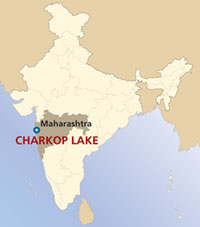| |
|
| |
|
|
|
| |
|
|
| |
|
|
|
|
|
|
|
|
|
| |
 |
| |
|
| |
|
| |
|
| |
Background |
| |
|
| |
The Charkop lake is located in Kandivli (West), Mumbai and is more than 50 years old. Sweet water was once used for potable purposes. Now it is used as 'Ganpati Imersion' talao (lake), where all local devotees gather during Ganpati festival. This lake is not only an important bird area, but also home for a host of fauna, contributing to the ecological and hydrological balance of the area. According to the Bombay Natural History Society (BNHS), the lake hosts at least 10 species of migratory and resident birds. It is also acts as a natural drain during the monsoon, which is a boon for the housing colonies surrounding it.
The main threat to the lake is the dumping of waste into the lake, which has lead to the deterioration of lake. The lake is slowly disappearing now, as builders continue to send trucks of construction debris to be dumped in its waters. The diameter of lake is reduced from initial 4-acres to just 2-acres today, and if the dumping continues, the lake would disappear in no time. And if lake vanishes, the low-lying area's water logging problems during the monsoon will intensify.
The United Association for Social, Educational and Public Welfare is a resident body opposing the 'systematic acquisition by land sharks'. The NGO is fighting to save the lake since 2004. They also recently ran ‘talao bachao’ campaigns and flashed hoardings and placards to create awareness. Nearly 300 residents signed a campaign to save the lake.
|
| |
|
|
| |
 |
|
| |
|
|
| |
|
|
| |
Links |
|
| |
Research Paper
Draft report on the Study of Lakes on Mumbai.
Read More…
|
|
|
| |
|
|
| |
 |
|
| |
|
|
| |
|
|
| |
|
|
| |
CHRONOLOGY |
|
| |
|
|
| |
2004: The United Association for Social, Educational and Public Welfare, the NGO have been fighting to save the lake. 5 per cent of the land had been filled with debris, and the locality faced floods for the first time. The builders had filled up the lake area after being allotted the land by the municipality.
2006: BMC couldn’t do anything to stop landfilling exercise on a 90-acre plot despite a damning report, which indicated this was the primary cause for flooding in the area last year.
2007: Activists launched campaign to save Charkop lake. In response, Mumbai collector, former Executive Magistrate and tehsildar Dashrat Sankhe had gone on record stating that the wetland is a natural water body and would be protected under any circumstances.
2008: Over a thousand truckload of debris was dumped to reclaim a substantial area of the natural water body. Collector Patil stated that he had initiated a high-level inquiry headed by a three-member team of deputy collectors and city officers to look into the matter and criminal proceedings would be initiated against the erring parties.
April 2008: 50% of the land is now filled with debris and residents raised a red flag over partial filling of lake for a housing project. The Mumbai Suburban Collector’s office issued a notice to stop the land filling till further notice and ordered a high-level inquiry into the issue.
The rubble is still not been cleared from the site.
February 2009: Court passed series of orders to protect mangroves in Mumbai area including Charkop in response to a PIL filed by Mumbai based NGO BEAG (Bombay Environmental Action Group) in 2005 to save the mangroves of Mumbai. The court ordered the BMC to spell out the action it has taken against structures that have come up as part of a World Bank funded MHADA (Maharashtra Housing And Area Development Authority) project in Charkop. The project is in violation of Coastal Regulation Zone rules and Oct 2005 High Court order.
April 2009: United Association for Social, Educational and Public Welfare, a Mumbai based NGO files a PIL to save the lake and high court admits the PIL.
May 2009: The residents around the lake allege that drainage is being diverted into the disputed lake, to further choke it and that land sharks are flouting PIL by filling up this water body. |
|
| |
|
|
|
| |
 |
|
|
| |
|
|
|
| |
|
|
|
| |
|
|
|
| |
|
|
|
|